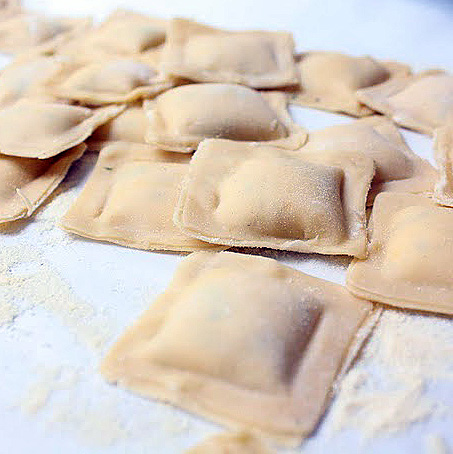
Lemon-Chevre Ravioli
On July 18, 2011 by sixtyacrebakerI have been making homemade pasta for as long as I can remember. Growing up, as summer arrived, so would my grandparents. Both sets. Heavily ladened with luggage and lessons, my grandparents were old school Italians. The “grandpops” sat on the sun porch playing cards and tending to the vegetable garden planted each year. The “grans” would sit at the kitchen table compiling lists of what would be needed for the evening supper. Pasta was always a side dish always homemade. We would make it several times each summer; filling our bellies and the freezer. The dining room became pasta central. The dining room table only used at Christmas, in a room that appeared hermetically sealed, would become a work bench covered in flour. We’d spend hours kneading, rolling, cutting, and drying our summer staple. It must be said, we never used 00 flour. It was hard to find and expensive–we used what we had on hand. It was delicious.
My grandparents have all passed and with them many of the summer traditions we all enjoyed. I still make pasta, in small quantities, with the same equipment as generations past. However, it is abundantly less shocking to see my dining room, littered with flour and covered in pasta. Sometimes I use 00 flour, if I have it on hand. But mostly, I use a high quality cake flour, which works beautifully for a delicate pasta, like this lemon pasta I used to make chevre ravioli. It is not quite how nonna would do it, but delicious none the less.
Lemon-Chevre Ravioli
for the pasta
3 cups cake flour (i use king arthur)
5 extra large eggs
2 tsp finely grated lemon peel
Place the flour in a mound on your work bench. Using your fist, make a large well in the center of the mound. Using the fork, bring the flour into the eggs to begin forming a dough. Continue bringing the flour in until you have a sticky mixture. Begin working the rest of the flour in by hand and knead for at least 10 minutes, and until you have a very smooth dough. The dough must be very smooth and well kneaded before leaving it to rest for 10 minutes or up to an hour at room temperature. Cover the dough with plastic or a towel or something to discourage a “skin” from forming. When ready, use a bit of flour so the dough does not stick and roll very thin. Cut in desired shape(s)
for the filling
5 oz chevre–room temperature
3 oz cream cheese–room temperature
1/2 tsp garlic powder
pinch nutmeg
1 tsp finely grated lemon peel
2 Tbs basil leaves–chiffonade
pinch salt
1/4 tsp white pepper
1 egg
1/4 cup grated parmesan cheese
Mix everything together until evenly incorporated. Place in refrigerator until using. Can be made up to a day in advance and kept covered in the refrigerator.
to assemble
small bowl of water and pastry brush
flour
semolina flour or cornmeal
It is important that your dough is rolled out thin, because you are using two pieces. it doesn’t have to be as thin as a won ton wrapper, but it should be close to it. If you are using a pasta machine, roll the pasta to the second thinnest setting.Place 1 sheet of pasta, cut into strips 2″ wide and as long as you like on your work surface. make sure your surface is dusted with flour to prevent sticking. Place filling with a teaspoon in the center of the dough, leaving room for even border on all sides. brush the dough, where you are going to seal the top piece, with water. Place a second piece of dough on top. Press around the filling with your fingers until you have a nice seal. Stamp with your ravioli cutter, cut with a knife, roller or cookie cutter to make uniform ravioli. Press the seams one more time. Place on a cookie sheet sprinkled with a bit of semolina or cornmeal to prevent sticking. Use immediately, or freeze for future use.